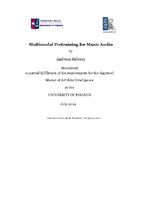| dc.contributor.advisor | Giannakopoulos, Theodoros | |
| dc.contributor.advisor | Γιαννακόπουλος, Θεόδωρος | |
| dc.contributor.author | Sideras, Andreas | |
| dc.contributor.author | Σιδεράς, Ανδρέας | |
| dc.date.accessioned | 2024-09-03T06:32:19Z | |
| dc.date.available | 2024-09-03T06:32:19Z | |
| dc.date.issued | 2024-07 | |
| dc.identifier.uri | https://dione.lib.unipi.gr/xmlui/handle/unipi/16697 | |
| dc.identifier.uri | http://dx.doi.org/10.26267/unipi_dione/4119 | |
| dc.description.abstract | Τα δεδομένα μπορούν να αποτυπώνονται σε διάφορες μορφές και μέσα. Για παράδειγμα, θα
μπορούσαμε να συναντήσουμε δεδομένα ήχου που συνοδεύονται από κείμενα αναφορικά με
τους στίχους τους. Τα σύγχρονα συστήματα εκμεταλλεύονται, όταν είναι διαθέσιμες, τις
πολλαπλές πηγές πληροφοριών και αυξάνουν την απόδοσή τους. Σε αυτές τις περιπτώσεις,
κάθε μέσο αποτυπώνει μια διαφορετική σημασιολογική διάσταση των δεδομένων. Πέρα από
τη πολυμεσική τους φύση, το πλήθος των δεδομένων μπορεί να είναι περιορισμένο και να
έχουμε έλλειψη επισημειώσεων για αυτά. Τεχνικές όπως η μεταφορά γνώσης και η
προεκπαίδευση συχνά βοηθούν σε αυτές τις συνθήκες. Στην διπλωματική αυτή ερευνούμε
διάφορους τρόπους προεκπαίδευσης ενός μοντέλου με σκοπό τη βελτιστοποίηση της
απόδοση σε ένα διαδοχικό πρόβλημα για το οποίο έχουμε λίγα δεδομένα και επισημειώσεις.
Ο στόχος μας είναι να εκπαιδεύσουμε ένα μοντέλο, το οποίο είναι ικανό να εξάγει χρήσιμα
χαρακτηριστικά και να χρησιμοποιηθεί σε οποιοδήποτε διαδοχικό πρόβλημα.
Χρησιμοποιούμε ένα Μεγάλο Γλωσσικό Μοντέλο (ΜΓΜ) ώστε να εξάγουμε προτάσεις που
σχολιάζουν το συναίσθημα και το θέμα των στίχων σε έναν σύνολο μη επισημειωμένων
μουσικών τραγουδιών. Κατά τη διάρκεια της προεκπαίδευσης μαθαίνουμε έναν χώρο στον
οποίο συσχετίζουμε το ηχητικό σήμα με τα κείμενα των σχολιασμών. Στη συνέχεια
εκπαιδεύουμε το μοντέλο στο επισημειωμένο σύνολο δεδομένων, όπου το μοντέλο δέχεται
σαν είσοδο μόνο το ηχητικό σήμα. Υπογραμμίζουμε τη σημαντική αύξηση στην απόδοση του
διαδοχικού προβλήματος, ειδικά σε συνθήκες όπου ελάχιστα δεδομένα είναι διαθέσιμα, τη
χρήση των ΜΓΜ στο βήμα της προεκπαίδευσης και τη σημασία του να εισάγουμε
πληροφορία αποτυπωμένη σε διαφορετικά μέσα. | el |
| dc.format.extent | 61 | el |
| dc.language.iso | en | el |
| dc.publisher | Πανεπιστήμιο Πειραιώς | el |
| dc.rights | Αναφορά Δημιουργού-Μη Εμπορική Χρήση 3.0 Ελλάδα | * |
| dc.rights.uri | http://creativecommons.org/licenses/by-nc/3.0/gr/ | * |
| dc.title | Multimodal pretraining for music audio | el |
| dc.title.alternative | Πολυμεσική προεκπαίδευση για μουσικά τραγούδια | el |
| dc.type | Master Thesis | el |
| dc.contributor.department | Σχολή Τεχνολογιών Πληροφορικής και Επικοινωνιών. Τμήμα Ψηφιακών Συστημάτων | el |
| dc.description.abstractEN | Data can be expressed in various forms, each potentially encoded through diverse
means. For instance, we might encounter audio data paired with descriptive texts
about their lyrics. Modern systems leverage, if available, the different sources of
information and outperform, under certain conditions, their single-modal
counterparts. In such multimodal settings, each modality encapsulates a distinct
aspect of the underlying semantics of the data and has a supplementary role. Data
can also be limited and without annotations related to the task at hand. In such cases,
transfer learning and pretraining could be two techniques that enhance the
performance of the models. In this thesis, we explore various unsupervised
pretraining techniques while evaluating them on a supervised downstream task. Our
goal is to train a model that can extract meaningful features and be further finetuned
to any new task. We use LLMs to create pseudo-captions that describe the sentiment
and the theme of the lyrics, from a large pool of non-annotated audio. We then
perform a pretraining step, where we learn a multimodal coordinated space between
the audio signals and these pseudo-captions. Then, we finetune our model on an
annotated dataset, where only the audio modality is available. We highlight the ability
of such models to deliver adequate performance in few-shot learning settings, the
incorporation of LLMs into the pretraining step, and the importance of learning a
shared semantic space for information originating from different modalities. | el |
| dc.corporate.name | National Center of Scientific Research "Demokritos" | el |
| dc.contributor.master | Τεχνητή Νοημοσύνη - Artificial Intelligence | el |
| dc.subject.keyword | Multimodal | el |
| dc.subject.keyword | Audio | el |
| dc.subject.keyword | Pretraining | el |
| dc.subject.keyword | Music | el |
| dc.subject.keyword | Finetuning | el |
| dc.subject.keyword | Metric learning | el |
| dc.date.defense | 2024-07-15 | |



